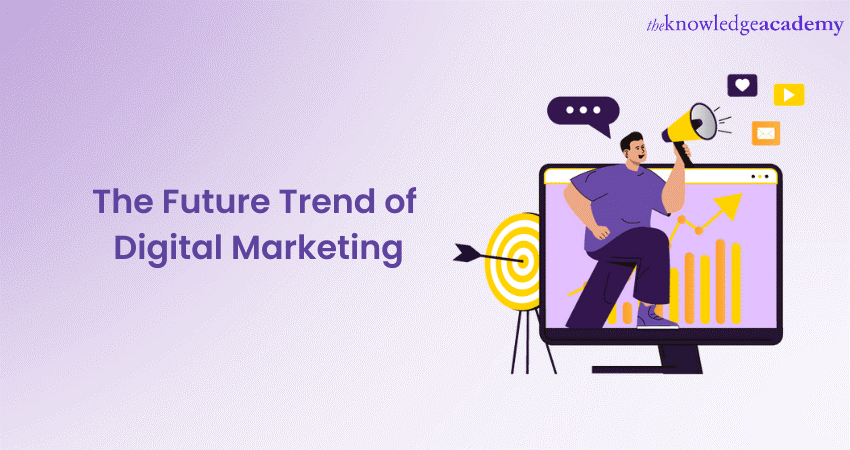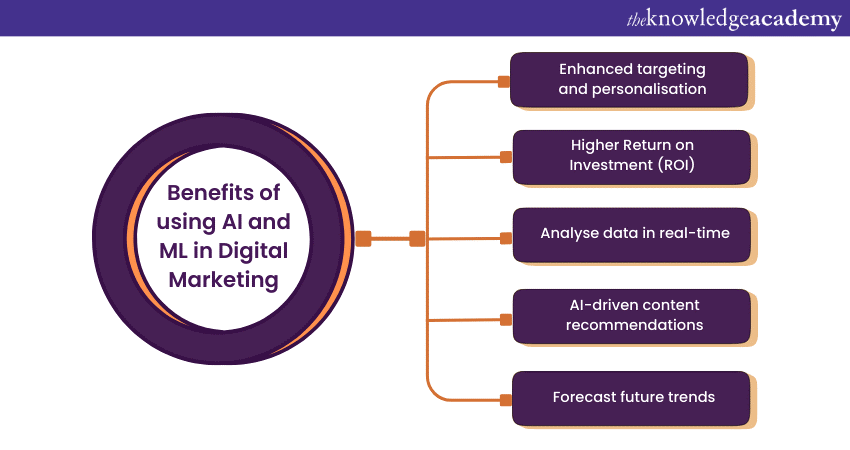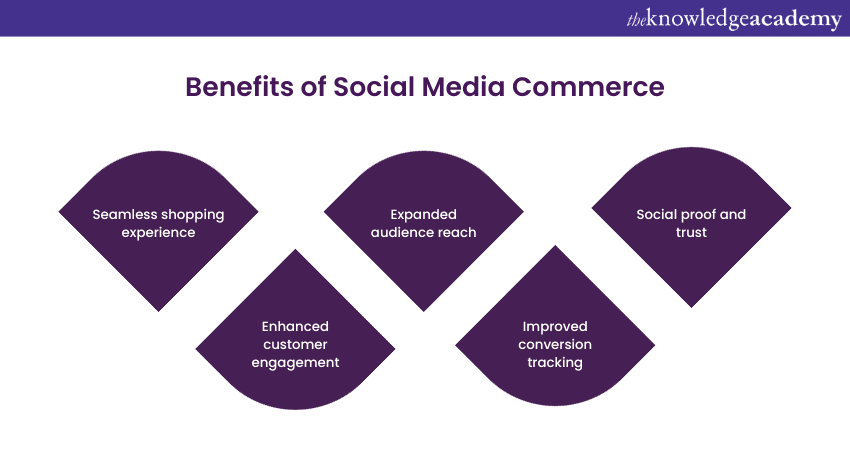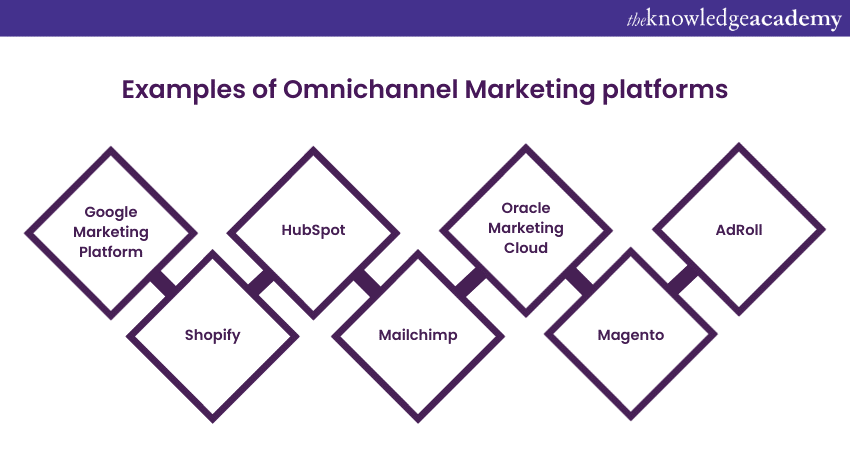We may not have the course you’re looking for. If you enquire or give us a call on +44 1344 203 999 and speak to our training experts, we may still be able to help with your training requirements.
We ensure quality, budget-alignment, and timely delivery by our expert instructors.

In Digital Marketing, the only constant is change. This medium has proven to be a potent force, driving businesses forward by enhancing customer relationships, personalising interactions, and significantly boosting return on investment. As we head further into the 21st century, this blog will explore the Future Trends of Digital Marketing, offering a comprehensive and detailed forecast.
Table of Contents
1) The top Future Trend of Digital Marketing
a) Artificial Intelligence (AI) and Machine Learning (ML)
b) Voice search and SEO
c) Chatbots and customer interactions
d) Augmented Reality (AR) and Virtual Reality (VR)
e) Video Marketing
f) Privacy and data security
g) Social media commerce
h) Role of big data
i) Influencer marketing
j) Predictive & prescriptive analytics
k) Omnichannel marketing
l) Interactive content
m) Blockchain technology
n) User-Generated Content (UGC)
o) Micro-moments
p) Neuromarketing
q) Sustainability and ethical marketing
r) Hyper-personalisation
2) Conclusion
The top Future Trend of Digital Marketing
Artificial Intelligence (AI) and Machine Learning (ML)
Artificial Intelligence (AI) and Machine Learning (ML) have already begun reshaping the Digital Marketing landscape, and their influence is poised to increase. AI can parse through vast datasets far quicker and more accurately than any human, identifying underlying patterns and trends that can be harnessed for targeted marketing campaigns.

Moreover, ML algorithms can adapt and learn from new data inputs, refining and optimising marketing strategies over time. This ability to learn and improve will give companies a unique edge, allowing them to stay in step with changing consumer behaviours and market trends. Digital marketers will need to familiarise themselves with these technologies to harness their full potential, combining data-driven insights with creative thinking to develop high-impact campaigns.
Voice search and SEO
As voice assistants become a commonplace feature in homes worldwide, digital marketers will need to adjust their strategies accordingly. Voice search fundamentally alters the way people search for information, with users favouring natural, conversational phrases over the terse keywords typically used in text-based searches.
The growth of voice search will necessitate a shift towards long-tail keywords and an increased focus on local SEO. Users typically ask voice assistants questions, so content must be optimised to answer them. Digital marketers who can adapt to this trend and effectively optimise their content for voice search will be well-positioned to reap the benefits of this growing technology.
Master the art of SEO with our SEO Masterclass – Sign up today!
Chatbots and customer interactions
The rise of AI-powered chatbots is set to transform the nature of customer interactions. Chatbots offer the promise of instant, 24/7 customer service, answering customer queries and addressing their needs without any human intervention.
This instantaneous, round-the-clock service can significantly enhance customer experience, fostering loyalty and trust. As AI technology becomes more sophisticated, these chatbots will become even more effective, able to handle complex queries and mimic human-like interactions. Digital marketers must embrace this technology, integrating chatbots into their customer service strategy to offer an exceptional customer experience.
Augmented Reality (AR) and Virtual Reality (VR)
The integration of AR and VR technology into Digital Marketing strategies opens up a world of opportunities for marketers. These immersive technologies can offer customers a more interactive and engaging shopping experience, from virtual tours of hotel rooms to 'try before you buy' AR filters.
While the adoption of AR and VR in Digital Marketing is still in its early stages, the potential of these technologies is immense. Companies that quickly adopt AR and VR will gain a competitive edge.
Video Marketing
Video content is rapidly becoming the most popular form of content among consumers, with platforms such as YouTube, Instagram Reels, and TikTok commanding vast global audiences. This shift towards video content provides digital marketers with an effective medium to engage with their audiences, conveying complex messages in an easily digestible and engaging format.
The future will see greater integration of video content into Digital Marketing strategies, from short-form videos on social media platforms to longer, in-depth explainer videos on company websites. Marketers will need to develop their video production skills, crafting high-quality content that resonates with their audience and promotes their brand message.
Privacy and data security
With an increasing emphasis on data privacy and the enforcement of strict regulations such as the GDPR, data security will become a paramount concern for digital marketers. Companies will need to demonstrate that they are handling customer data responsibly and ethically, providing transparency over how data is used and ensuring its security.
Data privacy concerns also present an opportunity for marketers to build trust with their audience, demonstrating their commitment to protecting customer data. This trust can lead to increased brand loyalty and customer retention, benefiting companies in the long run.
Conquer the Digital Marketing realm with our Digital Marketing Courses – Sign up now!
Social media commerce
The rise of social commerce - the integration of shopping experiences directly into social media platforms - presents digital marketers with a new avenue to reach their audience. By enabling purchases directly from social media platforms, companies can simplify the customer journey, increasing the likelihood of conversions.

Marketers must adjust their strategies to embrace this evolving e-commerce landscape, enhancing their social media content for shopping purposes and actively cultivating a brand-centric community. Those that can successfully harness the potential of social commerce will reap the rewards, reaching new audiences and driving increased sales.
Learn how to leverage social media to your advantage with our Social Media Masterclass – Sign up now!
Role of big data
As digital technology advances, the volume of data businesses can access is expanding at an astounding rate. This abundance of information, often referred to as 'big data,' presents a huge opportunity for digital marketers. The analysis of big data can yield invaluable insights into consumer behaviour, market trends, and the effectiveness of marketing campaigns. This helps businesses make data-driven decisions and refine marketing strategies.
The challenge lies in the interpretation and application of this data. As we move forward, digital marketers will increasingly need skills in data analysis and interpretation. By gaining a deeper comprehension of their target audience, businesses can customise their marketing campaigns to align more effectively with their customers, ultimately leading to business growth.
Influencer marketing
Influencer marketing has seen a considerable rise over recent years, and this trend is set to continue. Social media influencers, with their ready-made audiences and trusted voice, offer businesses a unique way to reach their target market.
As consumers increasingly turn to influencers for recommendations, businesses that establish successful partnerships with influencers will gain a significant advantage. Going forward, we'll see an increased focus on creating authentic, long-term relationships with influencers, moving away from one-off promotional campaigns.
Amplify your brand's impact with our Influencer Marketing Masterclass – Sign up now!
Predictive & prescriptive analytics
While predictive analytics is currently employed to forecast future trends using historical data, the future of Digital Marketing also encompasses the integration of prescriptive analytics. This technology can suggest various course actions and guide us towards a solution. For example, it could determine which marketing strategies are likely to bring the most engagement and suggest where to allocate resources.
Omnichannel marketing

Omnichannel marketing, the strategy of providing a seamless user experience across all channels, is becoming essential. It’s not enough to have a presence on multiple platforms; those platforms must offer a consistent, integrated experience for the consumer. This approach can lead to a more personalised and cohesive brand experience, ultimately fostering customer loyalty.
Interactive content
Interactive content is another area set to grow. This could take the form of quizzes, polls, augmented reality ads, or 360-degree videos. Such content can engage users more deeply and provide a more immersive experience, helping a brand to stand out in a crowded digital landscape.
Blockchain technology
Although blockchain is often associated with cryptocurrencies like Bitcoin, its potential applications in Digital Marketing are vast. Blockchain could offer a more transparent, secure way to track the journey of digital ads, helping to combat fraud and increase efficiency.
User-Generated Content (UGC)
User-Generated Content (UGC), in the form of reviews, testimonials, or user-posted social media content, has proven to be a potent tool for authenticity. Prospective customers often perceive UGC as unbiased and honest, which could significantly enhance a company's credibility. Therefore, digital marketers need to develop strategies that encourage and facilitate UGC, as this will play a crucial role in enhancing brand image and customer trust.
Micro-moments
Micro-moments refer to instances when consumers turn to a device—often a smartphone—to act on a need to learn, do, discover, watch, or buy something. In these moments, decisions are made and preferences shaped. Marketers will need to optimise their content to 'win' these micro-moments by providing users with the information they need precisely when they need it. This approach requires a thorough understanding of the customer journey and the ability to predict user behaviour.
Neuromarketing
Neuromarketing, the application of neuroscience to marketing, aims to understand consumers' decision-making processes better. With this, marketers can craft more effective campaigns based on psychological principles. While this field is still relatively new, it promises significant opportunities for the future, giving marketers deeper insights into consumer behaviour and potentially revolutionising the way we approach Digital Marketing.
Sustainability and ethical marketing
Increasingly, consumers are favouring brands that demonstrate a commitment to sustainability and ethical business practices. This consumer preference provides a significant opportunity for companies to differentiate themselves from their competitors. Digital marketers will need to ensure their campaigns and strategies reflect the company's commitment to these values, effectively communicating this to their target audience.
Hyper-personalisation
While personalisation is already a major focus in Digital Marketing, the future promises even greater levels of customisation. Hyper-personalisation involves using real-time data to create a completely personalised and contextual customer experience. By tailoring every interaction to the individual customer's needs and preferences, businesses can significantly enhance customer satisfaction and loyalty.

Conclusion
In conclusion, the Digital Marketing landscape of the future will be shaped by technological advancements, evolving consumer behaviours, and the increasing importance of ethical business practices. Businesses that can adapt to these changes, utilising new technologies and strategies to connect with their customers, will thrive in this dynamic environment.
From leveraging the power of user-generated content and capitalising on micro-moments to harnessing neuromarketing insights and prioritising sustainability, the possibilities are endless. The Future Trend of Digital Marketing promises to be an exciting journey, full of new opportunities for those ready to embrace and adapt to change.
Frequently Asked Questions
Upcoming Digital Marketing Resources Batches & Dates
Date
 Digital Marketing Course
Digital Marketing Course
Fri 28th Mar 2025
Fri 23rd May 2025
Fri 25th Jul 2025
Fri 26th Sep 2025
Fri 28th Nov 2025






 Top Rated Course
Top Rated Course


 If you wish to make any changes to your course, please
If you wish to make any changes to your course, please


